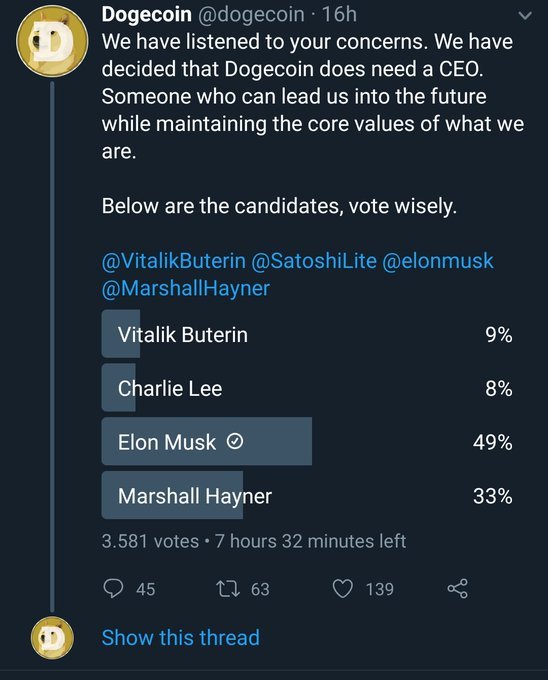Dogecoin is a cryptocurrency, like Bitcoin or Ethereum—although it’s a very different animal than either of these popular coins. Dogecoin was originally created at least in part as a lighthearted joke for crypto enthusiasts, and took its name from a once-popular meme. Despite this unusual origin story, it has exploded in popularity in 2021—as of writing, Dogecoin has become the fifth largest cryptocurrency by market cap.
What is Dogecoin?
Software engineers Billy Marcus and Jackson Palmer created Dogecoin in late 2013. Palmer branded the cryptocurrency’s logo using a meme popular at the time that featured the deliberately misspelled word “doge” to describe a Shiba Inu dog.
“Doge was really started to poke fun at Bitcoin,” said Pat White, CEO of Bitwave. In its early days, a community of enthusiasts arranged publicity stunts to raise Dogecoin’s profile, gathering funds to send the Jamaican Bobsleigh team to the 2014 Olympics, for instance, or sponsoring a NASCAR driver.
In early 2021, Dogecoin gained cult status on Reddit’s WallStreetBets message board—the prime instigator behind the GameStop affair in January—where enthusiasts had promised to propel its value “to the moon” (that was before all discussion of crypto was banned on the subreddit).
Today Dogecoin is no joke, having exploded in value and gained more than 5,000% in 2021. Among its boosters is Tesla CEO Elon Musk, who called Dogecoin his favorite cryptocurrency. Musk also named Dogecoin the “people’s crypto,” and promised to plant a physical Dogecoin token on the moon.

How Does Dogecoin Work?
Dogecoin is a cryptocurrency that runs on blockchain technology, similarly to Bitcoin and Ethereum. Blockchain is a distributed, secure digital ledger that stores all transactions made using a decentralized digital currency.
All holders carry an identical copy of the Dogecoin blockchain ledger, which is frequently updated with all new transactions in the cryptocurrency. Like other cryptocurrencies, Dogecoin’s blockchain network uses cryptography to keep all transactions secure.
People called miners use computers to solve complex mathematical equations in order to process transactions and record them on the Dogecoin blockchain—a so-called “proof of work” system. In exchange for processing transactions and supporting the blockchain ledger, miners earn additional Dogecoin, which they can then hold or sell on the open market.
Dogecoin may be used for payments and purchases, but it’s not a very effective store of value. This is chiefly because there is no lifetime cap on the number of Dogecoins that may be created by mining—meaning that the cryptocurrency is highly inflationary, by design. The blockchain rewards miners for their work by creating millions of new Dogecoins every day, which makes it very challenging for speculative price gains in Dogecoin to hold up over time.
Dogecoin vs. Bitcoin
Dogecoin has a few significant differences compared to Bitcoin. First, it’s quicker and easier for miners to complete the mathematical equations that complete and record transactions on the transactions, which makes Dogecoin somewhat more efficient for processing payments.
“Where it takes 10 minutes for the process to ratify new blocks on the Bitcoin blockchain, it takes only one minute on the Dogecoin blockchain,” said Gary DeWaal, Chair of Katten’s Financial Markets and Regulation group.
Another significant difference is the absence of any lifetime cap on the number of Dogecoins that can be created, as we noted above. There is a lifetime cap of 21 million Bitcoin that limits the maximum possible number of coins that can be created. This means that miners are forced to work harder and longer over time to earn new Bitcoin, and to a degree it helps guarantee Bitcoin’s ability to hold and grow its value over time.
How to Buy Dogecoin?
You can buy Dogecoin on a cryptocurrency exchange like Binance or Kraken. The exchanges require you to set up and fund an account with U.S. dollars or crypocurrency. You then are able to buy and exchange cryptocurrencies, including Dogecoin. Notably, leading crypto exchange Coinbase does not support purchases of Dogecoin.
Some online brokers, including Robinhood and TradeStation, also allow you to buy Dogecoin—in addition to conventional assets like stocks, mutual funds and bonds. They don’t offer as many of the cryptocurrencies as exchanges, but Dogecoin is generally available.
As with other cryptocurrencies, once you’ve purchased Dogecoin it’s best to move your coins to a crypto wallet. Wallets take many forms, from online services offered by exchanges like Coinbase (while you can’t buy Dogecoin on Coinbase, you can store it in your Coinbase wallet), to apps on your mobile device or even a physical hard drive. You secure the wallet with a private password. Since your coins are held outside of an exchange, there’s an extra layer of protection against hacks.
Before Dogecoin broke out into the mainstream and rocketed higher in price, you used to be able to earn free coins for doing basic tasks online.
“For many years, you could perform tasks at Dogecoin ‘faucets’ to earn Dogecoin instead of buying it,” said C. Neil Gray, partner in the fintech practice areas at Duane Morris LLP. “The tasks included things like watching an advertisement or taking a survey. More recently, it’s become difficult to find any that work.”
Is Dogecoin a Good Investment?
Since there is no lifetime limit on the number of Dogecoins that can exist, and millions of new Dogecoins are released onto the markets every single day, there is very little incentive to hold the cryptocurrency for the long term. Bitcoin continues to rise in value because of the system’s lifetime cap on the number of coins that can be created.
“Doge really is less like Bitcoin and more like DASH or Bitcoin Cash, where the express goal is a spending currency,” said White.
Historically, the per coin value of Dogecoin has been very low, around $0.003 per coin for most of 2020, so people were more likely to give them away. “Users on social platforms, like Reddit, Twitter, Facebook, and others, can use Dogecoin to reward, or “tip,” each other for posting content,” said Gray.
The gains in Dogecoin that have been seen in 2021 may not be sustainable over the longer term. Whether the crypto’s tipping and donating culture will continue remains to be seen.
Should You Buy Dogecoin?
Those who bought Dogecoin to start 2021 have been well rewarded. Still, White is a little wary about buying Dogecoin, especially as an investment. The constant flow of new coins onto the market put unending downward pressure on the coin’s value.
White also warned about additional security risks for Dogecoin, compared to other major cryptocurrencies. “It just hasn’t had the same security and code-level scrutiny that Bitcoin or Ethereum has. Plus, there’s just not a particularly robust mining community around Doge, so the exposure for a mining level attack is well above that of something like Bitcoin.”
Buying any sort of cryptocurrency involves risk, and that includes Dogecoin. It’s always worth buying a few coins and familiarizing yourself with the system—but it’s probably best to refrain from sinking more than a token amount of your hard earned money in a cryptocurrency that started life as a joke.

